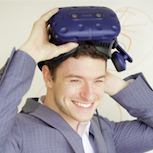
Taking Novel Ideas into Space
The Translational Research Institute for Space Health (TRISH) is funding health tech disruptors with novel approaches to advancing healthcare - for astronauts, and for patients here on Earth.
Non-dilutive funding is available for companies with pre-seed, seed and A-stage technologies ready to take their novel ideas into space.
Read more about TRISH's industry program.
Current Industry Research

Research: Conversational Intelligent Agents For Astronaut Behavioral Health and Performance
Institution: Ejenta (San Francisco, CA)
Start date: Nov. 1, 2020
End date: Oct. 31, 2021
Grant Mechanism: Industry
Study type: Ground study
NASA Risk Addressed: Med Tech / Devices
Project: Ejenta will develop a conversational intelligent agent to support the health and performance of crew members during long duration and exploration spaceflight. The intelligent agent facilitates communication, collaboration and connection with an astronaut's Earth-based support network, despite time delays, and it acts as a proxy when real-time monitoring and advising is not available from Earth.

Research: Oculometric Cognition Testing and Analysis in Virtual Environments (OCTAVE)
Institution: Z3VR
Start date: Nov. 1, 2020
End date: Oct. 31, 2021
Grant Mechanism: Industry
Study type: Ground study
NASA Risk Addressed: Med Tech / Devices
Project: OCTAVE will merge the Comprehensive Oculomotor Behavioral Response Assessment system with an enhanced XR system to deliver oculometric measures of human health and performance that could enable future research into neurocognitive, ophthalmological, and psychological stressors of spaceflight conditions with the necessary spatio-temporal fidelity, yet could be implemented operationally.

Research: Development of Next-Generation Probiotics to Combat Mental Health Risks for Space Travel
Institution: Holobiome, Inc.
Start date: Nov. 1, 2020
End date: Oct. 31, 2021
Grant Mechanism: Industry
Study type: Ground study
NASA Risk Addressed: Food
Project: Holobiome is developing next generation probiotics, derived from the healthy human microbiome, to address major global health problems. With this application we seek to explore utility of these strains to solve a major challenge for the intergalactic advancement of humanity -- the mental health of deep space explorers. We call these Astrobiotics.
Previously Funded Investigations

Principal Investigator: Erik Funkhouser
Research: Objective refraction with self-operable, lightweight autorefractor
Start date: Aug. 1, 2019
End date: July 31, 2020
Study type: Ground study
Research: Virtual Human Simulation Framework for Spaceflight Medicine
Aim: Long-duration human space flight requires new approaches to translating terrestrial medical technologies for use in space. Level Ex applies video game technology to develop medical simulation apps used for physician training and will adapt its existing framework to incorporate and explore the interplay of environmental conditions found in space. The focus is to simulate the data-derived impacts of the space environment on the human body and the performance of diagnostic tests and procedures in a virtual space. In addition, Level Ex will create high-fidelity virtual simulations of the interiors and conditions of spacecrafts.
Commercial potential on earth: Level Ex’s advanced medical simulation platform allows half a million medical professionals worldwide to practice medical procedures on lifelike virtual patients in real time. As Level Ex repurposes and builds on this technology for purposes of the grant, the resulting expansion in simulation capabilities will improve the ability of the technology to simulate new, rare, and complex scenarios across a range of medical specialties. This will allow physicians on earth to practice a wider range of difficult scenarios without putting a live patient at risk.

Principal Investigator: Shivang Dave, CEO
Research: Objective refraction with self-operable, lightweight autorefractor
Start date: April 1, 2019
End date: March 31, 2020
Study type: Ground study
Project: Over a billion people worldwide suffer from poor vision because they do not have adequate access to eye care professionals who can prescribe affordable eyeglasses. To meet this need, PlenOptika developed QuickSee, a portable, durable, low cost, yet highly accurate binocular autorefractor to quickly measure refractive errors and to monitor changes over time, making effective prescriptions easier to obtain. PlenOptika is planning a lighter model to make QuickSee easier to use for children and elderly patients, and other design advancements for faster and more reliable measurements.
PlenOptika designs innovative technologies to improve vision care globally. Their flagship device the QuickSee™ Wavefront Refractor was born at MIT, incubated at Harvard and Boston University, and raised around the world to meet high standards of vision and health care professionals under both rigorous clinical and demanding global health conditions. QuickSee’s accuracy has been published in peer-reviewed journals, it has earned international recognition and awards, and it is currently in use by private and nonprofit healthcare organizations internationally. www.plenoptika.com
Commercial potential on Earth: By miniaturizing and making QuickSee easier to use, PlenOptika will extend optometry/ophthalmology testing further in low resource environments across the world. Early detection of refractive errors and vision changes in vulnerable populations provides economic benefit not only to patients but also to payers, including state and federal Medicaid agencies.

Principal Investigator: Luc Gervais, Ph.D.
Research: Miniaturized Diagnostics Platform for Health Assessment in Deep Space
Start date: Sept. 1, 2018
End date: Aug. 31, 2019
Study type: Ground study
Aim: To miniaturize a next-generation point-of-care diagnostics device that performs sensitive, specific, and rapid detection of multiple blood-based biomarkers of spaceflight relevance.
Commercial potential on Earth: Accurate, portable point of care diagnostics platform that can detect disease early, enhance ambulatory care, enable home based testing, and extend low resource or low access healthcare.

Principal Investigator: Mehdi Javanmard, President
Research: The Cytotracker: Point-of-use Complete Blood Count
Start date: April 1, 2019
End date: March 31, 2020
Study type: Ground study
Aim: A complete blood count measures the number of different types of cells, such as red blood cells, white blood cells and platelets, in the blood. It is one of the most commonly performed laboratory tests in healthcare to monitor overall well-being and disease status. Current methods to obtain accurate blood counts require venous blood draws by a healthcare professional and utilize several different methods for counting and do not have the form factor necessary for operation by astronauts in space. Rizlab is developing a portable analyzer that combines unique and multiple sensors and methods for testing and provides rapid results that are simpler and less expensive than current testing methods. Their system will use a small amount of blood, which can be obtained from a finger prick, allowing use outside typical healthcare settings. The goal of this project is to build an analyzer that has the form factor and interface suitable for use in a space shuttle and extreme space environment.
Commercial Potential on Earth: Rizlab performs a CBC at the point of need using a small volume of blood from a finger prick. This has acute and chronic applications across ambulatory and low resource environments.

Principal Investigator: Dina Katabi, President
Research: Non-contact sleep, vitals, and behavior sensing
Start date: April 1, 2019
End date: March 31, 2020
Study type: Ground study
Aim: The Emerald device wirelessly analyzes radio signals to evaluate movement, breathing, sleep, and other behavior without the need to wear a device. It has been used in controlled environments such as laboratories and clinics, where the information was shown to be applicable to patient health outcomes. Emerald Innovations proposed to extend use of this device to a person’s natural living environment. To do so, the system must 1) collect, analyze, and store information continuously and reliably; 2) maintain user profiles to monitor changes; and 3) allow access to the stored information in a way that is easy to understand. When presented in a meaningful way, this information can guide user actions to improve health.
Commercial Potential on Earth: Noninvasive measurement of vitals and sleep patterns could help the peak health population to be more productive and catch onset of deteriorating health before the patient is aware of debilitation. Consumers can access their health status in their normal daily routine.

Principal Investigator: Jayant Menon, M.D.
Research: Autonomous Medical Response Agent (AMRA)
Start date: Sept. 1, 2018
End date: Aug. 31, 2019
Study type: Ground study
Aim: A collaborative medical control system that integrates health history, physical context, and desired health outcomes into real-time evidence-based guidance for Astronauts and Flight Surgeons to achieve and maintain optimal personal health and crew performance.
Commercial potential on Earth: Nahlia develops a personalized autonomous decision support tool for outcome based guidance through changing health dynamics. The system has applications through healthcare at every level, from disaster response, wilderness and military medicine, to family health management.

Principal Investigator: Felix Moser, Chief Scientific Officer
Research: Cell-free production of pharmaceutical-grade biologics
Company: Synlife, Inc.
Start date: April 1, 2019
End date: March 31, 2020
Study type: Ground study
Aim: Biomolecules, such as proteins, carbohydrates, and metabolites, hold promise as treatments and diagnostic markers for a wide variety of diseases, including cancer, diabetes, and Alzheimer’s disease. However, generating the appropriate biomolecules currently requires numerous chemicals and cell-culture systems. Synlife, Inc. proposed developing freeze-dried, cell-free extracts that can generate active biomolecules upon adding only water and DNA. Further, their kit would allow purification of these biomolecules to a level safe for human injection. This system will be low cost, highly portable, and have a long shelf life.
Commercial Potential on Earth: This novel approach to biomolecule manufacturing could have reagent, diagnostic, and therapeutic impact across a variety of potential disease states.

Principal Investigator: Elizabeth Palaima, Principle Scientist
Research: Room Temperature Stable Basic Metabolic Panel
Start date: April 1, 2019
End date: March 31, 2020
Study type: Ground study
Aim: Current methods for basic laboratory blood tests require a trained healthcare professional to draw blood using supplies that need refrigeration or may not have a long shelf-life. Ativa proposed to develop an easy-to-use basic metabolic panel test with 2-year shelf life and no need for refrigeration. Their system uses an electrosensor to analyze a small blood sample taken from a finger or heel prick, thereby eliminating the need for a trained phlebotomist to draw a blood sample. Test results are displayed on a touch-screen interface, both numerically and graphically, allowing non-experts to understand their own diagnostic results.
Commercial Potential on Earth: A novel approach to point of care metabolic testing, Ativa’s system manages reagents for longer life and minimizes the amount of blood needed from a finger prick. This simple user interface facilitates non expert users for personalized health management at home.

Principal Investigator: Arthur Papier, M.D.
Research: VisualDx Clinical Decision Support for Ultrasound
Start date: April 1, 2019
End date: March 31, 2020
Study type: Ground study
Aim: To improve medical clinical diagnosis and personal health decisions by patients globally. It combines machine learning and vision science with structured clinical data and clinical question sets.
Commercial Potential on Earth: AI-machine learning image based analysis is poised to transform the interpretation of radiologic, pathologic, ophthalmologic and dermatologic imagery. Comprehensive integration of machine learning image analysis with clinical decision support fills a need in exam rooms around the world. Furthermore, there is tremendous need for health information technology in rural and developing nations with limited network access. There is also limited clinical access to specialists in emerging markets. Our project with NASA will allow standalone access of our product globally thereby addressing these needs.

Principal Investigator: Arthur Papier, M.D.
Research: VisualDx Augmented Intelligence Project
Company: Logical Images, Inc.
Start date: Sept. 1, 2018
End date: Aug. 31, 2019
Study type: Ground study
Aim: Space travel presents unique challenges to healthcare, including the potential need for non-healthcare professionals to provide medical care. VisualDX has combined machine learning with clinical data to allow non-healthcare professionals to diagnose certain conditions. Dr. Papier proposed to expand the VisualDX system to include an Android version of the software that does not require internet access to use. This system could be used by astronauts during space travel to diagnose health conditions that may arise.

Principal Investigator: Anup Singh, Co-founder & Chief Science Officer
Research: InnaMed TeleLab Platform
Start date: April 1, 2019
End date: March 31, 2020
Study type: Ground study
Aim: InnaMed proposed developing TeleLab®, a smart, portable device that can test small molecule and protein biomarkers using a small (microneedle) amount of blood in the point-of-care or home settings. The platform uses published, patented electrochemical and DNA-based technologies to remotely monitor conditions such as heart failure and organ transplants and delivers cloud-based results to clinicians for therapy adjustment. This technology allows follow-up testing in a patient’s home rather than at a clinic visit, saving time and cost while improving the monitoring of chronic diseases.
Commercial Potential on Earth: InnaMed has developed a portable platform for accurate and extensive biomarker testing. This technology will support longitudinal patient engagement and encourage patient engagement in medication adherence and lifestyle choices.

Principal Investigator: Matteo Lai, CEO
Research: EmbraceX
Start date: April 1, 2019
End date: March 31, 2020
Study type: Ground study
Project: Empatica Inc. is developing a space-ready wearable health monitor. A traditional medical device electronics development process will be applied using state-of-the-art sensors, materials, and machine learning technologies. The durable and low-power EmbraceX device will be capable of sensing different physiological parameters to enable whole real-time health monitoring.
Commercial Potential on Earth: An AI-driven system for real time health monitoring that includes environmental measurement. Such a medical platform has applications across different healthcare conditions, especially in Neurology.

Principal Investigator: Ryo Kubota, Ph.D.
Research: Create a Compact, Unique, Swept Source-OCT Including Associated Analysis Algorithms, and Data Review Software for Deep Space Missions
Start date: March 1, 2019
End date: Feb. 29, 2020
Study type: Ground study
Project: Acucela is developing unique, self-testing, compact, vision diagnostic equipment that can be used in the space program and for in-home monitoring of eye diseases and overall eye-health, providing eye doctors ongoing valuable treatment information while saving astronauts’ time and complexity as well as providing superior care for patients while saving them time and money. Acucela is developing a unique Swept Source OCT (SS-OCT) employing a distinctive light source in combination with proprietary laser technology. A swept source OCT modulates the wavelength of a laser to achieve greater OCT resolution. This device will allow NASA to replace the current off-the-shelf OCT device(s) on the ISS with a more compact, easier to use self-testing device that is radiation hardened and allows lower bandwidth when transmitting health data back to earth. This increases practicality for smaller spacecraft as well and improves image quality received from astronauts in-flight.
Commercial Potential on Earth: In addition to the applications in space flight, this unique SS-OCT device will be initially commercialized by employing the technology in an in-home OCT system that will assist eye care providers in monitoring and treating such endemic diseases as Age-Related Macular Degeneration (AMD), Diabetic Macular Edema (DME), and other indications. This will modernize therapies, reduce medical costs, and improve the lives of patients afflicted with these disorders. It is expected to be smaller and less expensive than other home-based OCT systems.

Principal Investigator: Bob Main, M.S.
Research:
• Create the Technical Requirements, Strategic Roadmap, and Financial Requirements to Develop a Multifunction Ophthalmic Device for Comprehensive Ophthalmic Vision Testing on Deep Space Missions;
• Development of a Goggle-Based Visual Field Device Prototype;
• Development of Advanced Vision Testing Software for a Goggle-Based Visual Field Device Prototype;
• Development of a Self-Imaging, Wide Angle, High Resolution Retinal Imaging System for Human Spaceflight Applications
Start date: varies
End date: varies
Project: Web Vision Centers, LLC (Web Vision) is a vision care technology company that is developing technology that will help save the vision of millions of people globally. From a unique, compact self-testing retinal imaging camera and visual field device to an all-in-one vision testing device using AI to combine test results, the company is helping NASA and health care physicians detect, diagnose, and treat vision care problems. Their technology will save time, money, improve test results, and increasing access to vision care globally.
Commercial Potential on Earth: By miniaturizing and making the vision testing/diagnostic equipment self-testing, it will reduce the dependency of having a skilled technician taking the test and will save significant testing space in the office. This will also allow more access to vision testing/screening in rural areas and third world countries and, home monitoring of diseases like Age-Related Macular Edema (AMD).

Principal Investigator: Anup Sharma, Ph.D.
Research: Establish the feasibility of engineering a human optic-nerve-on-a-chip as an in vitro model for SANS research
Start date: June 1, 2019
End date: May 31, 2020
Study type: Ground study
Project: Astronauts exposed to long-duration missions experience fluid shifting from the legs to the head due to microgravity. Some astronauts will experience intracranial pressure changes, which could impact their vision or cause other negative health effects. AxoSim will develop inducible pluripotent stem cells to build on optic-nerve-chip to study if this tissue plays a role in SANS.








